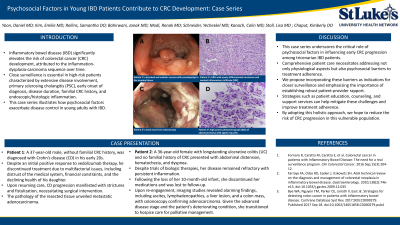Tuesday Poster Session
Category: IBD
P4406 - Psychosocial Factors in Young IBD Patients Contribute to CRC Development
Tuesday, October 29, 2024
10:30 AM - 4:00 PM ET
Location: Exhibit Hall E

Has Audio

Daniel Yoon, MD
St. Luke's University Health Network
Bethlehem, PA
Presenting Author(s)
Award: Presidential Poster Award
Daniel Yoon, MD, Emilie Kim, MD, Samantha Rollins, DO, Janak Bahirwani, MD, Ronak Modi, MD, Yecheskel Schneider, MD, Colin Kanach, MD, Lisa Stoll, MD, Kimberly Chaput, DO
St. Luke's University Health Network, Bethlehem, PA
Introduction: Inflammatory bowel disease (IBD) significantly elevates the risk of colorectal cancer (CRC) development, attributed to the inflammation-dysplasia-carcinoma sequence over time. Close surveillance is essential in high-risk patients characterized by extensive disease involvement, primary sclerosing cholangitis (PSC), early onset of diagnosis, disease duration, familial CRC history, and endoscopic/histologic inflammation. This case series illustrates how psychosocial factors exacerbate disease control in young adults with IBD.
Case Description/Methods: Patient 1: A 37-year-old male, without familial CRC history, was diagnosed with Crohn’s disease (CD) in his early 20s. Despite an initial positive response to vedolizumab therapy, he discontinued treatment due to multifactorial issues, including distrust of the medical system, financial constraints, and the declining health of his daughter. Upon resuming care, CD progression manifested with strictures and fistulization, necessitating surgical intervention. The pathology of the resected tissue unveiled metastatic adenocarcinoma.
Patient 2: A 36-year-old female with longstanding ulcerative colitis (UC) and no familial history of CRC presented with abdominal distension, hematochezia, and dyspnea. Despite trials of biologic therapies, her disease remained refractory with persistent inflammation. Following the loss of her 10-month-old infant, she discontinued her medications and was lost to follow-up. Upon re-engagement, imaging studies revealed alarming findings, including ascites, lymphadenopathies, a liver lesion, and a colon mass, with colonoscopy confirming adenocarcinoma. Given the advanced disease stage and the patient's deteriorating condition, she transitioned to hospice care for palliative management.
Discussion: This case series underscores the critical role of psychosocial factors in influencing early CRC progression among tricenarian IBD patients. Comprehensive patient care necessitates addressing not only physiological aspects but also psychosocial barriers to treatment adherence. We propose incorporating these barriers as indications for closer surveillance and emphasizing the importance of establishing robust patient-provider rapport. Strategies such as patient education, counseling, and support services can help mitigate these challenges and improve treatment adherence. By adopting this holistic approach, we hope to reduce the risk of CRC progression in this vulnerable population.

Disclosures:
Daniel Yoon, MD, Emilie Kim, MD, Samantha Rollins, DO, Janak Bahirwani, MD, Ronak Modi, MD, Yecheskel Schneider, MD, Colin Kanach, MD, Lisa Stoll, MD, Kimberly Chaput, DO. P4406 - Psychosocial Factors in Young IBD Patients Contribute to CRC Development, ACG 2024 Annual Scientific Meeting Abstracts. Philadelphia, PA: American College of Gastroenterology.
Daniel Yoon, MD, Emilie Kim, MD, Samantha Rollins, DO, Janak Bahirwani, MD, Ronak Modi, MD, Yecheskel Schneider, MD, Colin Kanach, MD, Lisa Stoll, MD, Kimberly Chaput, DO
St. Luke's University Health Network, Bethlehem, PA
Introduction: Inflammatory bowel disease (IBD) significantly elevates the risk of colorectal cancer (CRC) development, attributed to the inflammation-dysplasia-carcinoma sequence over time. Close surveillance is essential in high-risk patients characterized by extensive disease involvement, primary sclerosing cholangitis (PSC), early onset of diagnosis, disease duration, familial CRC history, and endoscopic/histologic inflammation. This case series illustrates how psychosocial factors exacerbate disease control in young adults with IBD.
Case Description/Methods: Patient 1: A 37-year-old male, without familial CRC history, was diagnosed with Crohn’s disease (CD) in his early 20s. Despite an initial positive response to vedolizumab therapy, he discontinued treatment due to multifactorial issues, including distrust of the medical system, financial constraints, and the declining health of his daughter. Upon resuming care, CD progression manifested with strictures and fistulization, necessitating surgical intervention. The pathology of the resected tissue unveiled metastatic adenocarcinoma.
Patient 2: A 36-year-old female with longstanding ulcerative colitis (UC) and no familial history of CRC presented with abdominal distension, hematochezia, and dyspnea. Despite trials of biologic therapies, her disease remained refractory with persistent inflammation. Following the loss of her 10-month-old infant, she discontinued her medications and was lost to follow-up. Upon re-engagement, imaging studies revealed alarming findings, including ascites, lymphadenopathies, a liver lesion, and a colon mass, with colonoscopy confirming adenocarcinoma. Given the advanced disease stage and the patient's deteriorating condition, she transitioned to hospice care for palliative management.
Discussion: This case series underscores the critical role of psychosocial factors in influencing early CRC progression among tricenarian IBD patients. Comprehensive patient care necessitates addressing not only physiological aspects but also psychosocial barriers to treatment adherence. We propose incorporating these barriers as indications for closer surveillance and emphasizing the importance of establishing robust patient-provider rapport. Strategies such as patient education, counseling, and support services can help mitigate these challenges and improve treatment adherence. By adopting this holistic approach, we hope to reduce the risk of CRC progression in this vulnerable population.

Figure: (Image A) Patient 1's ulcerated and nodular mucosa with pseudopolyp in the terminal ileum and (Image B) H&E with poorly differentiated carcinoma and marked inflammatory infiltrate (20X). (Image C) Patient 2’s rectal mass and (Image D) high-power photomicrograph (40x) of adenocarcinoma with signet ring cells.
Disclosures:
Daniel Yoon indicated no relevant financial relationships.
Emilie Kim indicated no relevant financial relationships.
Samantha Rollins indicated no relevant financial relationships.
Janak Bahirwani indicated no relevant financial relationships.
Ronak Modi indicated no relevant financial relationships.
Yecheskel Schneider indicated no relevant financial relationships.
Colin Kanach indicated no relevant financial relationships.
Lisa Stoll indicated no relevant financial relationships.
Kimberly Chaput indicated no relevant financial relationships.
Daniel Yoon, MD, Emilie Kim, MD, Samantha Rollins, DO, Janak Bahirwani, MD, Ronak Modi, MD, Yecheskel Schneider, MD, Colin Kanach, MD, Lisa Stoll, MD, Kimberly Chaput, DO. P4406 - Psychosocial Factors in Young IBD Patients Contribute to CRC Development, ACG 2024 Annual Scientific Meeting Abstracts. Philadelphia, PA: American College of Gastroenterology.

